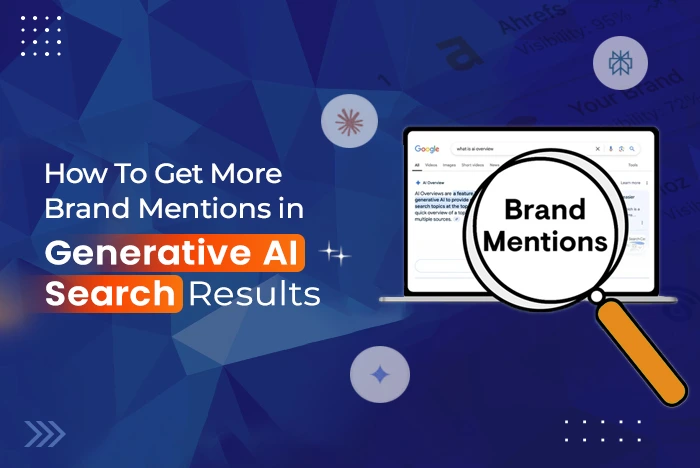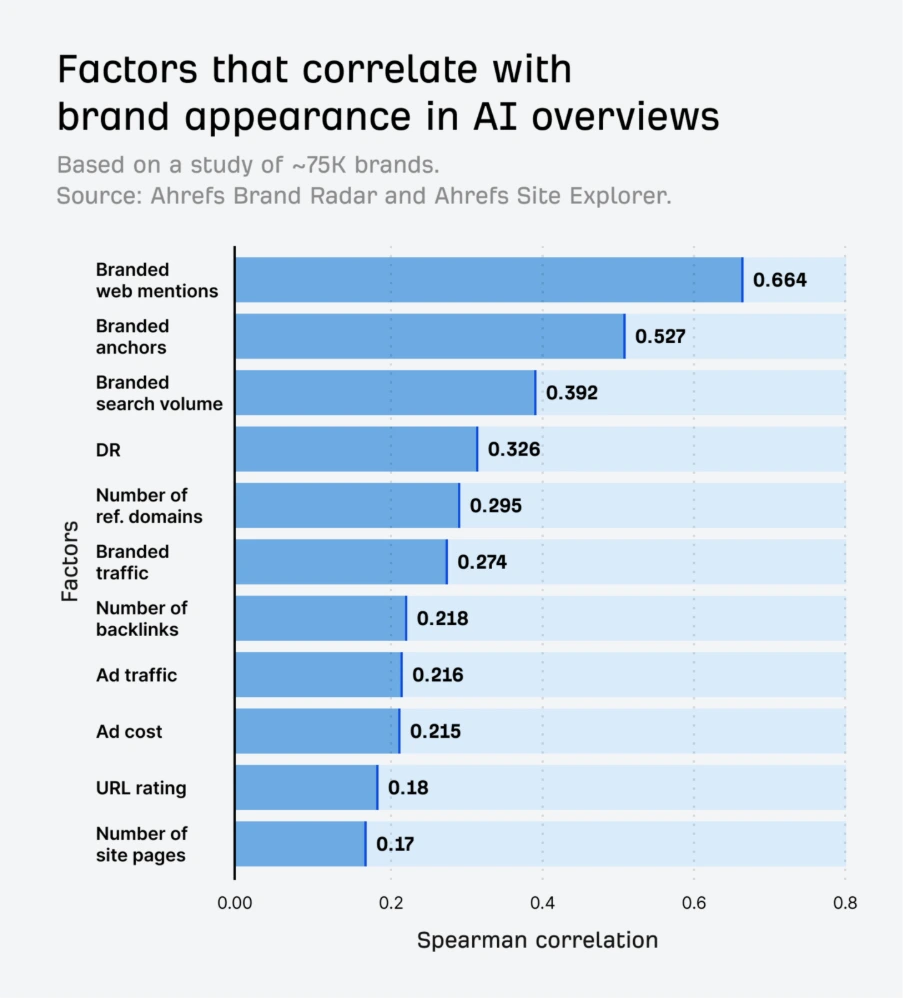
Generative AI systems are changing the way people find information, compare brands, and decide what to buy. AI search experiences don’t just show lists of blue links; they also give conversational answers by pulling information from many sources, figuring out what it means, and putting it all together into a single response. Because of this change, old-fashioned SEO isn’t enough anymore. Brands now need to make sure that generative AI models use knowledge sources, contexts, and content patterns that mention them when they come up with answers.
A recent analysis of ~75K brands shows that branded web mentions have the strongest correlation (0.664) with appearing in AI-generated overviews, followed by branded anchor text (0.527) and branded search volume (0.392). Traditional SEO metrics like backlinks and URL rating show noticeably weaker influence, highlighting that brand presence and recognition now matter more than raw link authority in generative AI search.

This is where GEO (generative engine optimization) services come in handy. SEO is all about making your site more search engine-friendly, while GEO is all about making sure your brand is easy to find and mention in AI-powered search results. Brands need to show authority, trust, relevance, and uniqueness at more than just their own websites in order to be successful.
This blog talks about how brands can use generative AI search results and conversational AI outputs to get more exposure and voice in a smart way.
The Move to Conversational Retrieval
People use search engines in different ways now. They don’t look for “best CRM tools” anymore; they ask:
“Why is this CRM the best for small businesses in 2025?”
AI search experiences take into account context, user intent, past behavior, and semantic meaning. The answer that comes up isn’t just taken from one webpage; it’s taken from a number of reliable sources.
In other words,
- Rankings are less affected by exact keywords.
- Sources of citations must show that they are reliable.
- Brand signals that are structured and unstructured are important.
- Mentions on the web affect how relevant the output is.
Brand presence, not just rankings, decides if a business is included in AI-generated answers.
The Increasing Significance of Brand Mentions
Recent studies in the field show how big the changes are. Gartner says that by 2026, 60% of online searches will be done through AI-based interfaces instead of regular keyword-driven search engines. According to a BrightEdge study, almost 51% of the most popular commercial searches on major search engines now show AI-powered search results above organic listings.
This shows that brands need to be in the data that AI systems use to make outputs. Generative models gain knowledge from:
Websites that are reliable
- Coverage in trustworthy media
- Forums and reviews from the public
- Profiles for business and social life
- Databases and sources of information for the industry
The AI won’t mention you if your brand isn’t mentioned in these sources.
How GEO Services Help Brands Get Seen
GEO does more than just optimize content for keywords. It looks at the signals that help AI systems decide that your brand is a good source of information.
Some of the main areas are:
- Entity Recognition means making sure that AI language models understand the brand as a unique idea.
- Strengthening presence in high-trust sources that the models often refer to is called authority reinforcement.
- Semantic Content Structuring means writing content that makes sense to big language models.
- Cross-Channel Brand Signal Expansion means getting more mentions in the platforms and datasets that are used to train or improve AI models.
AI search optimization services make sure that these points of contact are strategically aligned and consistent all over the web.
Strategies to Increase Brand Mentions in AI-Powered Search Results
- Improve entity-based SEO to get more brand mentions in AI-powered search results
Brands need to make sure that search engines see them as separate from other businesses. This includes:
- Making Google Business Profiles better
- Making sure that the Name-Address-Phone (NAP) information is always the same
- Making structured data markup
- Keeping your profiles up to date on trusted business and industry directories
These steps help AI tools confirm that your brand is real.
- Get more exposure in trusted sources
AI models prefer content from trusted sources like expert platforms, high-trust publications, and official databases. Brands should put first:
- Contributions of thought leadership to industry websites
- Guest posts in niche magazines
- Mention in educational or government-related settings when possible
This increases the probability of being referenced by AI systems when answering complex queries.
- Write in-depth, expert-level content on a wide range of topics
Semantic patterns are used by generative AI engines to judge expertise. Content that is meaningful and deep shows authority better than blog posts that only scratch the surface. Content should:
- Show insights that are based on research
- Use topic clusters to add depth to the context.
- Include perspectives, reasoning, and unique angles rather than generic information
Brands that show they know what they’re talking about are more likely to show up in AI search results.
- Ask for reviews from people who aren’t connected to you and mentions from other people.
AI systems often refer to user-generated content because it shows that people trust it in the real world. Encourage:
- Reviews from customers on Google, Trustpilot, Yelp, and G2
- Talk about it on Reddit, Quora, and other forums about it
- Comments from influencers and links to niche bloggers
Distributed reputation signals make it easier to find things in generative search results.
- Make Social Knowledge Graph Signals Better
Social media isn’t just for branding; it also helps AI map interests. Keep:
- LinkedIn authority that is strong
- Strong real-time content on X (Twitter)
- YouTube has thought leadership videos that are as good as those made by professionals.
Platforms that show active participation and knowledge of the subject matter strengthen the semantic value of your brand.
Why GEO Is Now Necessary for Competition
As AI search becomes the main way to make decisions, brands that don’t change will slowly stop being thought of by consumers. More and more, generative AI models give you direct answers instead of making you browse. Now, how visible you are depends on whether the AI thinks your brand is useful, relevant, and trustworthy.
This can’t be done with just traditional SEO. GEO-driven AI search optimization services work to make sure:
- AI uses knowledge sources that include your brand.
- Your brand is always linked to areas of topical authority.
- At the entity level, people can tell your brand apart from others.
This makes things easier to find in both explicit searches and implicit mentions in conversational AI outputs.
Last Thoughts
Generative AI is changing the way we find things online. It’s no longer enough to be at the top of search results; you also need to be included in the answers that AI systems come up with. Brand mentions now require building credibility, semantic structure, entity clarity, and widespread presence across authoritative and user-generated platforms.
Brands can get meaningful visibility in AI-powered search results and stay a part of future buying journeys by using generative engine optimization (GEO) services and putting money into AI search optimization services.
Getting found in generative AI outputs is not just a trend; it’s now a strategic priority for every brand that wants to stay competitive in a search environment driven by AI.
Want More Brand Mentions in AI Search Results?
e intelligence helps brands strengthen their presence in AI-generated search experiences and conversational outputs. Contact us to improve your brand authority, credibility, and visibility across generative AI channels.



